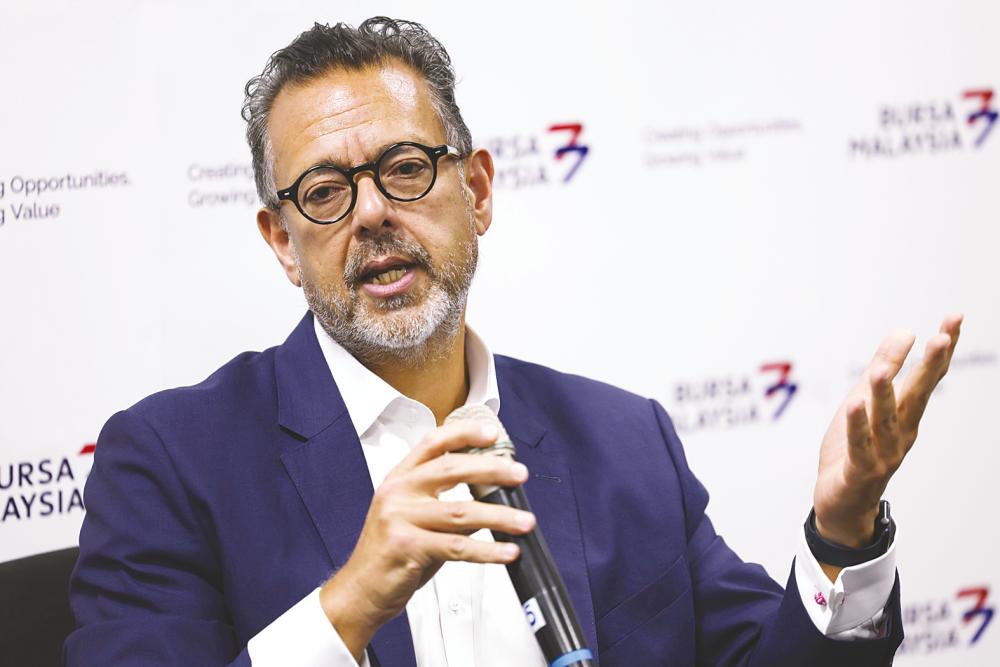PETALING JAYA: Bursa Malaysia Bhd foresees a trajectory towards higher corporate earnings and expanded fundraising activities in 2024, driven by a strengthened economic growth outlook for the year.
Based on a recent World Economic Outlook report, the International Monetary Fund has projected slower global gross domestic product (GDP) growth from 3% in 2023 to 2.9% in 2024, amid a possible further slowdown in China’s economy, volatile commodity prices stemming from risks of extreme climate and geopolitical shocks, as well as subdued global financial conditions.
Despite the global projections, CEO Datuk Muhamad Umar Swift said, the outlook for Asean and Malaysia appears more bullish, with the GDP of the Asean-5 countries, comprising Indonesia, Malaysia, the Philippines, Singapore and Thailand, expected to grow at a faster pace of 4.5% in 2024, compared with 4.2% in 2023.
“The accommodative policies implemented by central banks in advanced economies may positively impact emerging markets including Malaysia, where the lower borrowing costs in hard currencies are likely to bolster the emerging markets’ carry trade.
“On the domestic front, Malaysia’s economy is poised for improvement in 2024, with the Ministry of Finance projecting 2024 GDP growth at 4% to 5%, up from the estimated 4.0% growth in 2023. This optimism is supported by resilient consumer spending and an anticipated further recovery in the tourism industry, facilitated partly by the 30-day visa free policy for visitors from China and India,” he told SunBiz.
In addition, he said the progress of multiyear investment projects, along with catalytic initiatives under the Madani Economy framework – including the National Energy Transition Roadmap (NETR), New Industrial Master Plan 2030 (NIMP 2030), as well as the mid-term review of the 12th Malaysia Plan – are expected to stimulate activities in the equity market.
“Considering these factors, the stronger economic growth forecast for 2024 will pave
the way for higher corporate earnings and fundraising activity expansion,” he said.
Muhamad Umar said the exchange is looking forward to the year albeit anticipating continued challenges in the global economic landscape, due to factors such as evolving trade dynamics, geopolitical shifts and potential commodity price volatility.
“Our hopes for 2024 are centered on navigating these uncertainties prudently and with resilience, leveraging our diversified portfolio of listed companies and implementing strategic initiatives to mitigate risks and capitalise on opportunities,” he added.
Specifically, he said Bursa Malaysia aims to adapt to changing market conditions by enhancing technological infrastructure and strengthening regulatory frameworks.
“These measures are essential not only for maintaining market stability, but also for fostering an environment that instills confidence among investors. We remain committed to our role in driving economic activities and providing a robust platform for investors amid the dynamic global economic landscape.”
Muhamad Umar reiterated that the exchange will continue with its ongoing initiatives to boost market vibrancy and will work closely with regulators to ensure market efficiency, accessibility, and liquidity in support of participants.
Moreover, the exchange remains committed in continuing its efforts to advance environmental, social and governance (ESG) practices in the local capital market.
To support companies at different stages of ESG maturity, it will continue to facilitate the upskilling of corporate leaders and employees through collaborations with relevant partners as the initiative aligns with the exchange's commitment to capacity building activities in accordance with its disclosure requirements.
“Bursa Malaysia, alongside other influential entities, will continue to focus on increasing corporate competitiveness and aligning with the nation's climate-related commitments. Anticipating the ongoing implementation of key blueprints such as NETR, NIMP 2030, the bourse is poised to play a pivotal role in supporting the nation's transition to a lower carbon economy,” said Muhamad Umar.
He said the exchange envisions a cohesive effort involving various stakeholders, including ministries, agencies, and other entities, to encourage ESG adoption across businesses of all sizes.
“Initiatives such as our Centralised Sustainability Intelligence Platform and the Ministry of Investment, Trade, and Industry’s i-ESG framework for guiding micro, small and medium enterprises are poised to better position Malaysian companies favourably in the global market for green products, services and investments,” he added.









